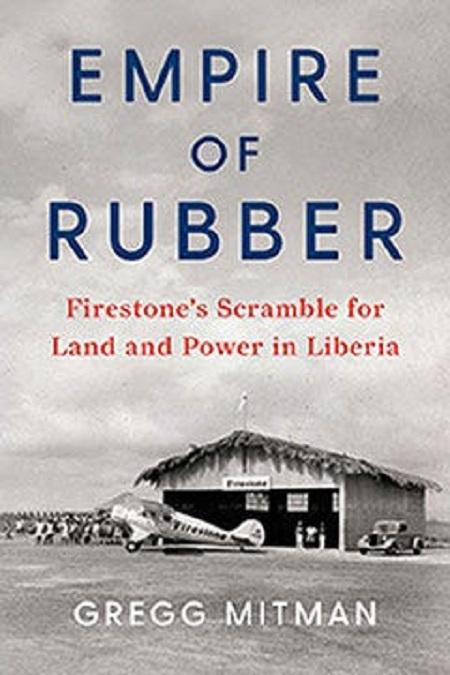Africa-Press – Liberia. The history of rubber production is charged with social injustice and rapacity. Rubber companies, including those in Akron, got their raw material from plantations in Vietnam, Sumatra, the Philippines and Brazil. Gregg Mitman, a professor of history, medical history and environmental studies at University of Wisconsin-Madison, narrows his research to one company and one country in “Empire of Rubber: Firestone’s Scramble for Land and Power in Liberia.”
In his preface, Mitman says he was not able to use the Firestone archives for research. He makes up for it with an overview of Harvey Firestone and his establishment in Akron, and his friendship with Henry Ford and Thomas Edison. Mitman then turns to a history of Liberia and its founding by the American Colonization Society as a settlement for Black Americans.The project was endorsed by activist W.E.B. Du Bois, who saw it as an opportunity for self-rule and organization and challenged an elite group of educated, prominent Black men to go to Liberia and “lift it up as a nation.” In 1925 Firestone purchased a million acres of land with a loan of $5 million. The company began clearing the land of trees, including one that was considered sacred by indigenous people. Smallpox and yellow fever cases rose.‘Sideman’ set in Columbus dive bars of 1980s
The dive bars of Columbus in the early 1980s are the setting for “Sideman,” a semiautobiographical debut novella by Jeff Beitzel of Dover. Beitzel is here represented by Jack Bradley, who plays bass wherever anyone will pay him to do it.
There is no real plot; the episodic narrative finds Jack first playing with a heroin-addicted kleptomaniac guitarist, then with a hipster harmonica player. Jack lives with a dubious collection of housemates in a place called Little Bohemia, where he brings women and takes hallucinogenic mushrooms. The sex is explicit and the language more so.
Jack meets real-life musicians Jaco Pastorius, Adrian Belew and Lonnie Mack, with pointed comments on their career trajectories and personal issues.
“Sideman” (82 pages, softcover) costs $7.95 from online retailers.‘In Review: The Eclectic Works of the Write Stuff Authors Group’
“In Review: The Eclectic Works of the Write Stuff Authors Group” is a compilation of prose and poetry from the Canton-based project which began in 2017, according to founder and leader Don Ake.
Among the fiction standouts are “Untimely Vanishing” by Timothy Schen of Massillon, in which a faded magician’s trick works all too well, and “Anon” by Jeffrey Paolano, not listed in the table of contents, in which a spirited resident plans to escape his assisted living facility.In nonfiction, “You Are the Current Resident (and Other Observations),” an essay by the pseudonymous “Joe Carrier,” vents about postal patrons who insist on returning junk mail, dodging certified letters or answering the door in the altogether.
“The Write Stuff” (290 pages, softcover) costs $11.99 from online retailers. A previous book, “In Context,” was released in 2019 and costs $9.99.
Events
Mandel Jewish Community Center (26001 S. Woodland Road, Beachwood): The Cleveland Jewish Book Festival continues with Danny Adeno Abebe, who talks about his memoir “From Africa to Zion: The Shepherd Boy Who Became Israel’s First Ethiopian-Born Journalist” in a free virtual presentation from 11 a.m. to noon Sunday. In an in-person event at the community center from 7:30 to 9:30 p.m. Wednesday, David Page, Emmy-winning creator of “Diners, Drive-Ins and Dives,” talks about “Food Americana: The Remarkable People and Incredible Stories behind America’s Favorite Dishes.” Admission is $10; register at mandeljcc.org/bookfest.
Loganberry Books (13015 Larchmere Blvd., Shaker Heights): Brian Hochman signs “The Listeners: A History of Wiretapping in the United States,” 1 p.m. Sunday.
Mansfield-Richland County Public Library (Butler branch, 21 Elm St.): James A. Willis, founder of the “Ghosts of Ohio” paranormal research organization and author of “The Big Book of Ohio Ghost Stories,” talks about his investigations and displays equipment, 6 to 7 p.m. Monday.
Cuyahoga County Public Library: Jennifer Haupt (“In the Shadow of 10,000 Hills”) launches “Come As You Are,” set in the early ’90s Seattle grunge scene, in a conversation with fellow novelists Caroline Leavitt (“With or Without You”) and Susan Henderson (“The Flicker of Old Dreams”) in a Zoom event from 7 to 8 p.m. Tuesday. From 7 to 8 p.m. Tuesday, Mary Weems and Bryant Keith Alexander discuss their books “Collaborative Spirit-Writing and Performance in Everyday Black Lives” and “Still Hanging: Using Performance Texts to Deconstruct Racism.” From 7 to 8 p.m. Thursday, Bonnie Kistler, author of the thriller “The Cage,” talks to Wendy Walker (“American Girl”).Hudson Library & Historical Society: British journalist Catherine Ostler talks about “The Duchess Countess: The Woman Who Scandalized Eighteenth-Century London,” about the Georgian courtesan Elizabeth Chudleigh, whose shocking behavior, including a charge of bigamy, fascinated Georgian society, in a Zoom event at 7 p.m. Wednesday. Advance notice for an event of great interest: At 7 p.m. March 8, Canadian author Margaret Atwood (“The Handmaid’s Tale”) will discuss her work with Elizabeth Wagoner, assistant professor of English at Kent State University, in a Zoom event.
Mitman describes the stark difference in treatment between the white staff and Black employees at the facility; the white management had private bungalows, a golf course and turkey dinners while the Black workers had mud houses with thatched roofs. They performed the tasks of tapping rubber trees, planting and tending rubber tree seedlings and processing latex. The company provided a free hospital that was a major enhancement to employment, especially the maternity clinic.
Mitman finishes up with a description of today’s Liberia.
“Empire of Rubber” (312 pages, hardcover) costs $27.99 from The New Press.
For More News And Analysis About Liberia Follow Africa-Press






